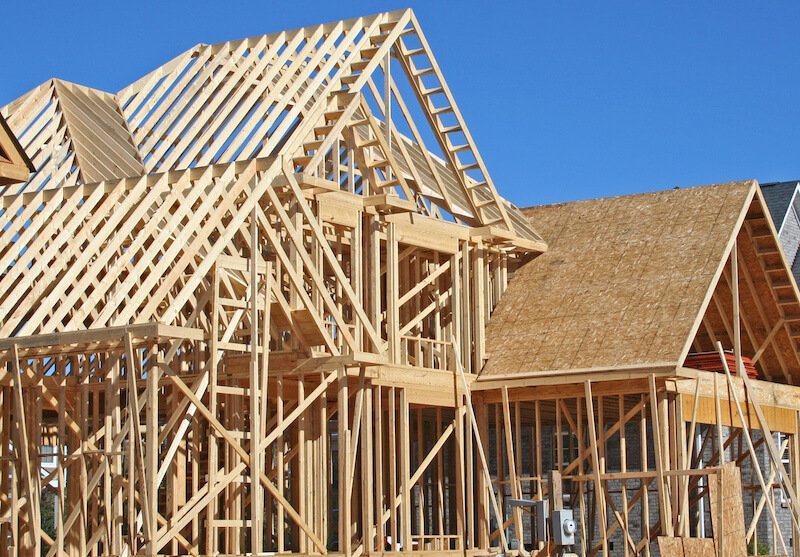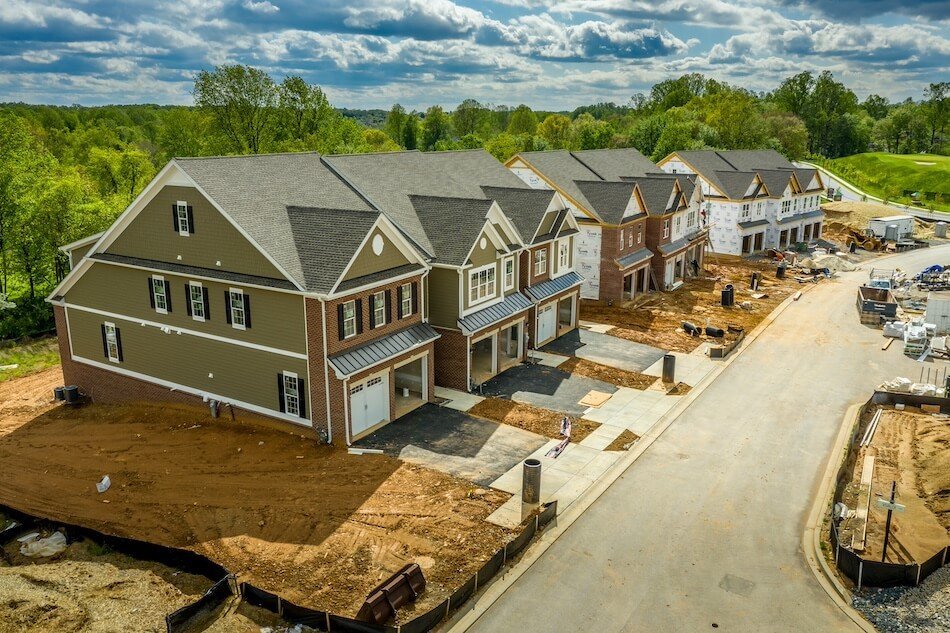
There's something special about a brand-new house. Whether it's that fresh-built smell or the modern features, new construction homes have a ton of benefits.
Let's get real about what you'll love (and what might drive you crazy) with new construction homes. No sugar-coating here. Just the real pros and cons of new construction homes to help you decide if new construction is right for you as a home buyer.
6 Pros & Cons of Buying a New Construction Home
- Pro: You get to pick your layout, finishes, and features—making the home truly yours
- Pro: Lower energy bills thanks to better insulation and efficient systems
- Pro: Less fixing and repairing in the first few years can help you save money
- Con: Expect to pay more upfront compared to similar existing homes
- Con: Building takes time—often 7+ months with potential delays, depending on whether you've chosen stick or masonry or another type of build
- Con: Many planned communities limit design choices more than you'd expect
The Good Stuff About New Construction

You Get to Make It Your Own
With fully custom new construction homes, you choose what goes into your house from the start. Want an open kitchen with modern floor plans? Extra bathroom? Specific flooring? You decide. You just need to find the right home builder to bring it to life.
This means no settling for someone else's choices like you would with a pre-owned home. Your newly constructed home reflects your taste from day one, unlike existing homes where previous owners made all the decisions.
If you're going with a spec home, you'll have fewer choices. With spec homes, you're typically choosing from a menu of layouts, color palettes, and upgrade packages rather than having the freedom to customize every aspect. While spec homes offer convenience and often lower costs, you sacrifice the personalization that comes with a truly custom build.
Less Maintenance for Years
Brand-new homes mean brand-new everything—roof, appliances, modern plumbing, electrical systems, you name it.
The average homeowner spends up to $6,000 a year on major repairs. With new construction, you'll enjoy lower maintenance costs and avoid most of that headache for the first few years.
Plus, construction homes typically come with home builder warranties covering major systems and structural elements. These builder's warranty protections mean when something does go wrong, you're not paying out of pocket.
That New Home Feeling
There's nothing like being the very first person to live in a home.
No mysterious stains, no worn-out spots in the carpet, no fingerprints on the walls. Everything is fresh, clean, and untouched.
You won't be sleeping where someone else slept or cooking in a kitchen that's seen years of use. For many buyers, this fresh start feeling is worth a lot.
Lower Energy Bills (For Real)
New construction homes are much more energy-efficient than older houses—and that means real savings on energy costs.
Better insulation, modern windows, updated electrical grids, and efficient heating/cooling systems can cut your energy bills by up to 25%. With the average Tennessee energy bills exceeding $1,600 a year, that's serious money back in your pocket.
These newly built homes also include energy-efficient appliances and often smart home features that help you track and control energy use. Even the light fixtures in new construction are designed to use less electricity. Your wallet (and the planet) will thank you.
The Not-So-Good Parts: Cons of New Construction

Waiting... and Waiting... and Waiting
That perfect newly built home? You'll need patience—lots of it.
Most new construction homes take at least 7 months to build, often about eight months for complete construction, and that's when everything goes right in the construction process. If economic conditions spur supply chain issues or labor shortages, many home buyers will end up waiting much longer.
Bad weather can stop work for weeks. Construction materials delays can push timelines back months. Be ready for your move-in date to change, maybe more than once.
If you need a home quickly, new construction probably isn't your best bet—a pre-existing home would be faster.
It Costs More Than You Think: Is It Cheaper to Build Or Buy in Tennesee?
If you're looking in Tennessee specifically, here's what you need to know about costs:
Buying an existing home typically costs less upfront. The median home prices in Tennessee range from around $360,000 to $394,000, varying by source. You'll move in faster and avoid the unpredictable costs that come with buying a new construction or building a home.
Building new in Tennessee runs between $100–$500 per square foot, with most single-family home construction coming in around $200 per square foot. That means a 2,000-square-foot home costs roughly $400,000 to build—before financing land, permits, and site work. The construction loans process can also be more complex than standard mortgages.
For most people, buying existing is cheaper and simpler. You'll also benefit from established infrastructure, mature landscaping, and often better locations. But if you want everything exactly your way and can handle the higher upfront cost and additional costs, building might be worth it.
And those beautiful upgrades in the model home? They're rarely included in the base price. Want quartz countertops instead of laminate? Stone floors instead of vinyl? The latest and greatest sustainable construction materials? Each upgrade adds to your bottom line, often at marked-up prices.
Many buyers end up spending 10-25% more than they planned once they start customizing. Remember to factor in property taxes, too—they're often higher on new construction due to the higher assessment.
"You Can Have Any Color... As Long As It's Beige"
Despite promises of customization, many new construction communities limit your choices more than you'd expect.
In new construction neighborhoods and master-planned communities, you might be restricted to just a few floor plans and a small selection of finishes. Some homeowners associations have strict rules about exterior colors and materials to keep a consistent look across the entire community.
If you have specific design must-haves or want a truly unique home, a production builder in new construction neighborhoods might feel too restrictive. Urban development projects and construction communities often face even tighter restrictions.
The new construction interior design may lack character and warmth in some buyers' opinions. On the other hand, you may see bland walls as a canvas ready to be filled with your favorite colors and wall prints.
The Price Is the Price
New construction homes rarely have room for negotiation when it comes to price.
Unlike individual sellers in the real estate market who might be motivated to compromise, construction homes are priced by builders who set their prices and stick to them, especially in a seller's market.
While you might get some closing cost help or buyer incentives like a few free upgrades through builder incentives or financial incentives, significant discounts are rare. There's little room for the back-and-forth negotiation that can save you money with pre-owned homes. In a buyer's market, you might have more leverage, but most new construction isn't priced to negotiate like existing homes.
Questions People Actually Ask
Do new homes hold their value?
They can—but it depends. Homes from reputable home builders in good locations typically maintain strong resale value. Energy-efficient features and modern layouts appeal to future buyers.
However, newly constructed homes face the initial "drive it off the lot" depreciation. Like brand new home purchases, they lose a bit of their premium once they're no longer a perfect clean slate. Newly constructed homes tend to stabilize in value after this initial adjustment.
Location matters more than age in real estate. A new construction home in a so-so area won't appreciate as well as an older home in a prime neighborhood with community amenities and a new neighborhood feel.
What mistakes do people make with new construction?
The biggest one? Underestimating the total cost. Many buyers focus only on the base price and forget about extra costs like:
- Landscaping (often not included)
- Window treatments
- Upgraded light fixtures
- HOA fees in new construction neighborhoods
- Higher property taxes for newly built homes
People also misjudge timelines in the home-buying process and get stuck in expensive temporary housing when delays happen. The construction process rarely finishes on schedule—expect about eight months from start to finish, minimum.
Another common mistake: not researching the home builder thoroughly. Check their reputation, see their previous work, and talk to past clients before signing anything. Ask real estate agents for their recommendations on the best local home builders.
Is New Construction Right for You?
New construction homes give you modern features, energy efficiency, and that fresh-start feeling. If you have time to wait, don't mind paying more, and value having everything new, they're worth considering. Many builders offer more affordable options, if you’re open to buying a condo or a townhouse.
But if you need to move quickly, want maximum negotiating power in the home-buying process, or prefer established neighborhoods with mature trees and landscaping, an existing home or pre-owned home might suit you better. You'll save money and avoid construction headaches.
The right choice depends on what matters most to you—convenience, customization, or cost. Your real estate agent can help you weigh these factors.
Think about your must-haves and deal-breakers. Visit both new construction homes and existing homes. Run the numbers carefully, including all those potential extra costs. And remember: the perfect home for you is the one that fits your life, not just what's trendy right now.



